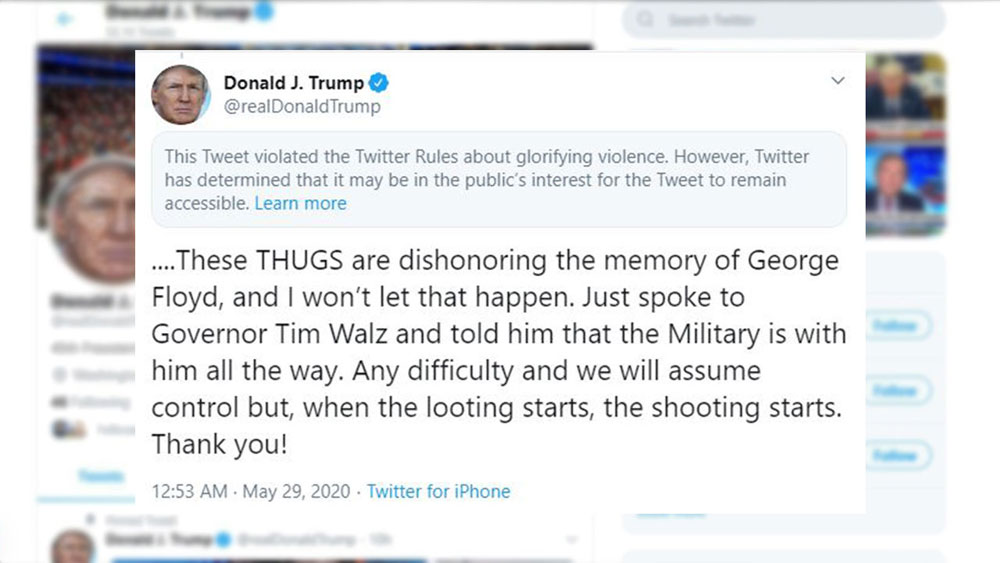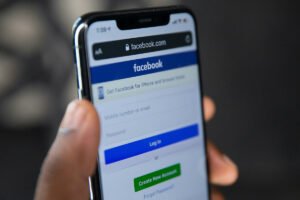
June 2, 2020; CNBC and the New York Times
Worries about the ways social media can fan the flames of societal conflict have grown in the wake of the 2016 US elections. The new debate we find ourselves in concerns the power of platforms to balance free speech against social responsibility.
The capacity to share the video of George Floyd’s murder at the hands of four Minneapolis police energized a wave of protests. Twitter, Facebook, YouTube, and other platforms made attacks on black and brown people impossible to ignore. As horrific as the images are, few have protested their publication.
President Trump also turned to social media to share his view of the protests with the nation. “These THUGS are dishonoring the memory of George Floyd,” he tweeted, “and I won’t let that happen.…Any difficulty and we will assume control but, when the looting starts, the shooting starts.”
These words became the latest salvo in a continuing controversy over the limits of free speech and the responsibility of the companies who connect billions of people around the globe.
Twitter is one of the president’s favorite methods of communication. For more than a year, Twitter has had a policy against tweets that “glorify violence.” Such messages can get a user’s account suspended or revoked. However, the president has been granted something of a pass on this, as his tweets are considered of historical value. This one seems to have been a bridge too far; Twitter concealed the tweet behind a digital veil and added a “public interest” notice to it. According to CNBC, it can still be viewed with a click or reposted with a comment, but users cannot like, retweet, or reply to it.
On the other hand, Facebook saw this language as protected political speech and took no action to label it or to limit its spread across its network. CEO Mark Zuckerberg posted his view that he needed to separate his personal opinion from his corporate responsibility.
Sign up for our free newsletters
Subscribe to NPQ's newsletters to have our top stories delivered directly to your inbox.
By signing up, you agree to our privacy policy and terms of use, and to receive messages from NPQ and our partners.
I’ve been struggling with how to respond to the president’s tweets and posts all day. Personally, I have a visceral negative reaction to this kind of divisive and inflammatory rhetoric. This moment calls for unity and calmness, and we need empathy for the people and communities who are hurting. We need to come together as a country to pursue justice and break this cycle. But I’m responsible for reacting not just in my personal capacity but as the leader of an institution committed to free expression. I know many people are upset that we’ve left the president’s posts up, but our position is that we should enable as much expression as possible unless it will cause imminent risk of specific harms or dangers.
Zuckerberg spoke with the president before making this decision, and later convened with Rashad Robinson of Color of Change (with whom Facebook has had conflict before), Vanita Gupta of the Leadership Conference, and Sherrilyn Ifill of the NAACP Legal Defense Fund to discuss his rationale. Afterward, they issued a statement of dismay, describing themselves as “disappointed and stunned by [his] incomprehensible explanations.”
He did not demonstrate understanding of historic or modern-day voter suppression and he refuses to acknowledge how Facebook is facilitating Trump’s call for violence against protesters. Mark is setting a very dangerous precedent for other voices who would say similar harmful things on Facebook.
Speaking to CNBC, Robinson made the point even more strongly:
Mark Zuckerberg talked to Donald Trump right before he decided not to actually remove the content from Facebook’s platforms that Donald Trump had put out around shooting protesters. He didn’t call civil rights leaders on the other side and have conversations about the civil rights implication. When we’ve had conversations about voting rights and discrimination, what becomes clear a couple of steps in is that Mark Zuckerberg probably knows as much about civil rights and about voter suppression as I know about the sort of deep intricacies of coding and building the sort of technological backend of a social media platform.
Barry Schnitt, who served as Facebook’s director of communications and public policy from 2008 until 2012, took to the Medium blog platform on Monday to question whether Zuckerberg’s decision reflected anything more than a desire to protect his bottom line: “Facebook says, and may even believe, that it is on the side of free speech. In fact, it has put itself on the side of profit and cowardice.”
MarketWatch noted that 33 former employees said in a letter that the standards that they helped develop to control misuse of the platform were not reflected in the decision to keep the president’s posts online. “They have decided that elected officials should be held to a lower standard than those they govern. One set of rules for you, and another for any politician, from your local mayor to the president of the United States.” And, according to the New York Times, a current Facebook employee directly challenged Zuckerberg to justify “why are the smartest people in the world focused on contorting and twisting our policies to avoid antagonizing Trump?”
The popularity of social media has made its leading firms rich and powerful. Under current law and regulations, they set their own standards about what can and cannot be posted. This case demonstrates the lack of outside accountability for how these standards are developed or applied.—Martin Levine












